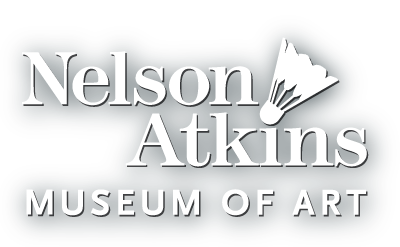Adinkra Cloth
CultureAkan peoples, Asante subgroup
Date1900-1925
MediumIndustrial cotton fabric and vegetable dye
DimensionsApproximate: 90 × 132 inches (228.6 × 335.28 cm)
Credit LinePurchase: the Shirley and Barnett Helzberg Fund in support of the African Art department
Object number2013.2.6
On View
Not on viewCollections
DescriptionThe cloth is a large white fabric with black patterns printed on it. It is composed by joining together several long, one-foot-wide strips edge-to-edge employing a distinctive embroidery technique that uses colored threads. Against the dominant white background are several stamped motifs arranged in squares, also created with the stamps. The end-design is grid-like. During pre-colonial times, Adinkra cloths, as such cloths were called, were mainly associated with funerals. The term adinkra, “to give message”, meant that the Asante intended the cloth’s stamped motifs as message bearers; indeed each different motif had a specific meaning, so a finished cloth could be inscribed with multiple messages--personal, political, and philosophical. The expectation was that the deceased would carry the messages to relatives who have long departed.ProvenanceWith John Akwasi Adu Agyei, Kenteland Enterprise, Accra, Ghana, by 2012 [1];
Purchased from John Akwasi Adu Agyei by The Nelson-Atkins Museum of Art, Kansas City, MO, 2013.
NOTES:
[1] According to John Akwasi Adu Agyei, Kenteland Enterprise, he bought this cloth from an elder of the town of Ntonso, near Kumasi.
Information about a particular artwork or image, including provenance information,
is based upon historic information and may not be currently accurate or complete.
Research on artwork and images is an ongoing process, and the information about a
particular artwork or image may not reflect the most current information available to the Museum.
If you notice a mistake or have additional information about a particular artwork or image,
please e-mail provenance@nelson-atkins.org.














